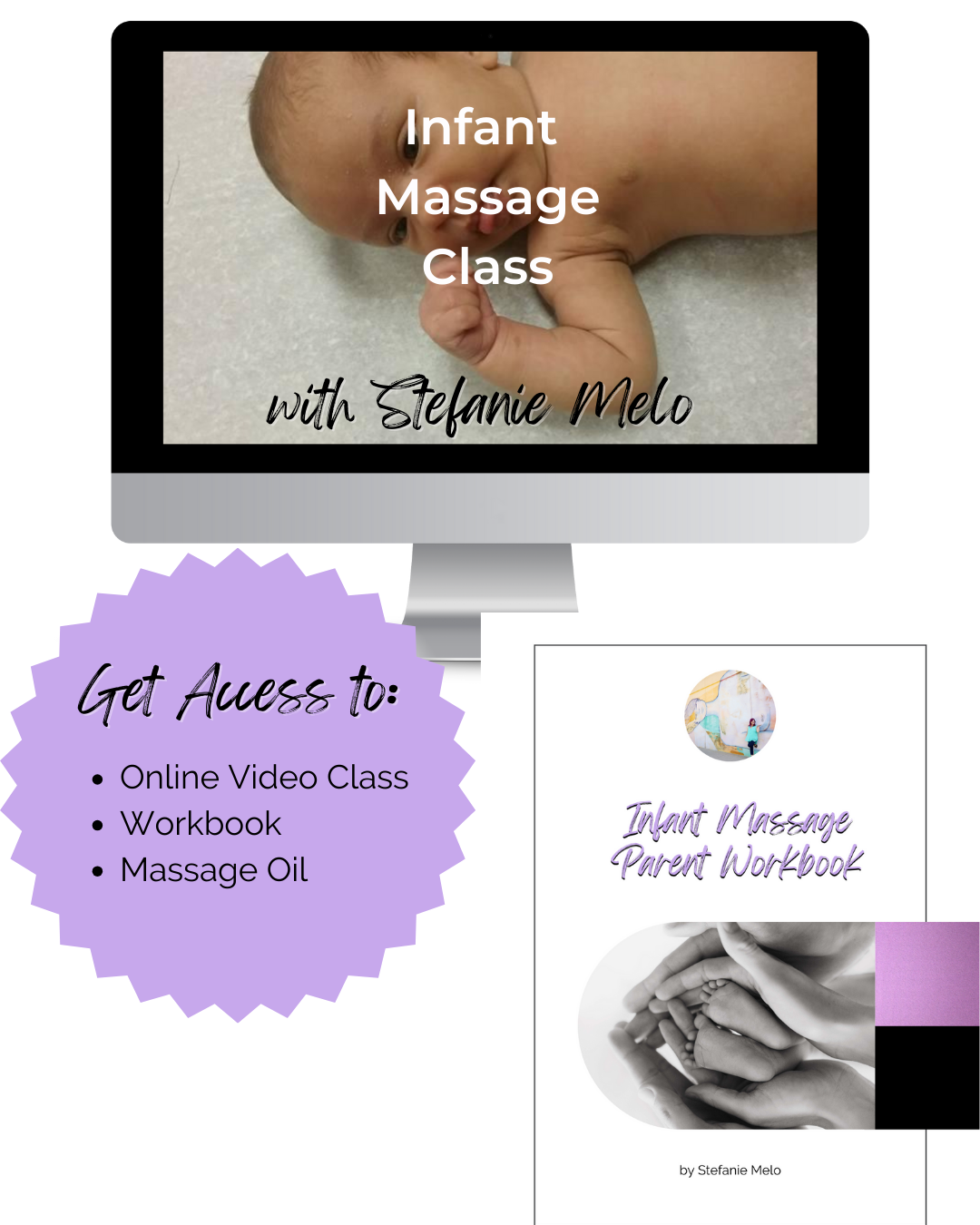One Heck of a Tool

What if you knew how to reduce your baby’s bilirubin levels the first week of life (even if your milk is slowly coming in)?
How would it feel to help your baby sleep well without harsh sleep training?
How incredible would it be to have a “step by step” routine that helped you bond with baby + reduce both of your stress levels?
How amazing would it be to help your preterm infant gain weight faster and come home sooner?
Wouldn’t it be lovely if the baby's father had a simple way to increase father-baby bonding?
What if you could learn this for less than $100 and be able to offer it to your baby at any time at no additional cost?
Would that be worth your time and money? Of course! Let’s go!
Reducing Jaundice Infant Massage has been shown in multiple studies to reduce bilirubin serums levels in infants. If you aren’t familiar, bilirubin is a yellow substance produced in the breakdown of red blood cells. What you need to know about it is that high bilirubin levels indicate jaundice, and newborn jaundice can be dangerous. Even with great technology, jaundice can be a stressful situation for parents. *
Infant Massage has been shown in multiple studies to reduce bilirubin serums levels in infants. If you aren’t familiar, bilirubin is a yellow substance produced in the breakdown of red blood cells. What you need to know about it is that high bilirubin levels indicate jaundice, and newborn jaundice can be dangerous. Even with great technology, jaundice can be a stressful situation for parents. *
Sleep Improvements without Sleep Training

Infants need lots of sleep and lots of milk. Sometimes, as a caring parent these two needs seem in opposition. There are times your sweet, sweet baby doesn’t seem to sleep long. While most babies do need to wake up several times during the night four nourishment (which of course helps your milk supply), that doesn’t mean they have to experience restless sleep. 123 infants & mothers were studied while using massage as part of a bedtime routine and the results show The bedtime routine resulted in improvements in child and mother night wakings, maternal perceptions of -child sleep and mood, and improvements in maternal sleep quality.**
Infants and toddlers with sleep onset problems were given daily massages by their parents for 15 minutes prior to bedtime for one month. Based on parent diaries the massaged versus the control children (who were read bedtime stories) showed fewer sleep delay behaviors and had a shorter latency to sleep onset by the end of the study. Forty-five minute behavior observations by an independent observer also revealed more time awake, alert and active and more positive affect in the massaged children by the end of the study.
Infant Massage Improves Mother-Baby Attachment

Infant massage has been shown to significantly improve emotional availability between mother and baby. ***** Massage given to premature neonates by their mothers on a daily basis can promote and maintain emotional attachment between the mother and her infant. The findings of the present study can be used ******
Infant Massage Improve Father-Baby Interactions

Infants were given massages by their fathers for 15 minutes prior to their daily bedtime for one month. By the end of the study, the fathers who massaged their infants were more expressive and showed more enjoyment and more warmth during floor-play interactions with their infants.
Weight Gain
One of the most common measurements of healthy infant development is weight gain. There are so many studies on infant massage and weight gain, I won’t cite them all here. The improvement in weight gain has been heavily researched in preterm infants and infants staying in NICU. Infants given daily massage had 21% greater weight gain per day and infants in the control group. Essentially, massage has been shown to improval vagal nerve activity and gastric activity. The vagus nerve is responsible for digestion
heart rate
breathing
cardiovascular activity
reflex actions, such as coughing, sneezing, swallowing, and vomiting
Learn Infant Massage
Infant massage can improve baby’s health, improve baby’s sleep quality, promote mother and baby bonding, promote father-baby bonding, improve vagus nerve function, improve weight gain (and other measures of growth). So, what are you waiting for? It’s time to learn infant massage.
Here is your invitation, come to my next infant massage class
Sources
*Basiri-Moghadam M, Basiri-Moghadam K, Kianmehr M, Jani S. The effect of massage on neonatal jaundice in stable preterm newborn infants: a randomized controlled trial. J PakMed Assoc.2015;65:602-6.
**Mindell, J.A., Lee, C.I., Leichman, E.S. & Rotella, K.N. (2018). Massage-based bedtime routine: Impact on sleep and mood in infants and mothers. Sleep Medicine, 41, 51-57.
***Porreca, A., Parolin, M., Boh4, G., Freato, S. & Simonelli, A. (2017). Infant massage and quality of early mother-infant interactions: Are there assocaitions with maternal psychological wellbeing, marital quality, and social support? Frontiers in Psychology, 2017 Jan 17;7:2049. Doi: 10.3389/fpsyg.2016.02049. eCollection 2017.
****Cullen, C., Field, T., Escalona, A. & Hartshorn, K. (2000). Father-infant interactions are enhanced by massage therapy. Early Child Development and Care, 164, 41-47.
******The Effects of Massage by Mothers on Mother-Infant Attachment. Mahnaz Shoghi, Soroor Sohrabi, Mahboobe Rasouli PMID: 29101776
 You're probably so excited about welcoming your baby into your home, if you're like most moms you're probably flipping through a few books, you've download some apps, and listening to your friend's and family's experience. You're probably doing your part to be a star patient for your doctor or midwife.
You're probably so excited about welcoming your baby into your home, if you're like most moms you're probably flipping through a few books, you've download some apps, and listening to your friend's and family's experience. You're probably doing your part to be a star patient for your doctor or midwife.I totally get that, and this is actually a problem because you're going to get you varied, sometimes conflicting advice that might not even work for your circumstance, and here is the kicker: lots of time's it not evidence-based guidance.
Instead of that, I want to offer you that working with a doula from your first trimester through your postpartum time is actually going to give you what you really need: cohesive information, expert guidance and the emotional support that every new mom deserves. It's like having an a doula in your pocket (or purse if that's where you keep your phone)
Hiring a Digital Doula is the best way to have a positive experience during your pregnancy, birth and postpartum. I would love to be your digital doula.
You’re Invited to a FREE Workshop Tomorrow at 8am MST. You sign up here Join us live or watch the recording.
Last December, I was reflecting on the year and creating my goals for 2022. I participated in a workshop and started seeing goal setting & vision boards in a new light.
When I learned time management, goal setting and planning those were highly logical, systematic approaches to life. I grew up learning that the dominant male influence in business + was the only way to be successful. I also learned that women shouldn’t be in business, but that is a story for another day.
The problem was, I was moving away from my natural inclinations: relationships, intuition, creativity and all the complex emotions of being human. My natural bent is also not particularly visionary, I am more of a words person. I can’t generally “see” a project or a vision in my head: I need outside support do to that (a sketch, a magazine picture, etc)
In the past, when I did vision boards I didn’t really FEEL anything, though I knew all the experts said that it’s a good exercise.
There was a disconnect and suddenly: it all made sense.
The imagery + the emotions + the words + the goals + the planning all “clicked." The Envision Workshop was born. This year we have offered four workshops, one for each season and this time around we are offering one on the Winter Solstice.
As Solstice is the darkest day of the year, it also reminds us: the light is returning. Yet, it’s still dark: what purpose can darkness offer our lives and business? We often associate darkness with uncomfortable things: like depression, loss, suffering and loneliness, PMS.
There is another aspect to darkness and we need that as humans, especially as women. Rest. Reflection. Intuition. The Hygge, the cozy. How can Winter offer you wisdom, insight, and help you take critical action as a busy mama running a business?
Join us and we’ll show you.This is an interactive, reflective workshop. Whether you join live, or watch the recording, this 90 minutes is going to help you reflect, rest, envision and align your actions in this season.
Who this is for:
- The Female Entrepreneur Feeling Burnout
- The Mompreneur who longs for more rest
- The Woman wear of non-stop hustle energy
- The Business owner building a business that supports a life she loves.
- The Entrepreneur who wants intentional business growth
- The Woman who knows the value of enjoying the wins and celebrating her success
- The woman tired of thinking the mensural cycle is a hinderance to her life & business
P.S. That was really long! Here’s the recap: We are hosting a free workshop tomorrow to help female entrepreneurs connect their goals and vision without ignoring the natural rhythms of the seasons and the female design. Sign up here:
 You're probably so excited about welcoming your baby into your home, if you're like most moms you're probably flipping through a few books, you've download some apps, and listening to your friend's and family's experience. You're probably doing your part to be a star patient for your doctor or midwife.
You're probably so excited about welcoming your baby into your home, if you're like most moms you're probably flipping through a few books, you've download some apps, and listening to your friend's and family's experience. You're probably doing your part to be a star patient for your doctor or midwife.I totally get that, and this is actually a problem because you're going to get you varied, sometimes conflicting advice that might not even work for your circumstance, and here is the kicker: lots of time's it not evidence-based guidance.
Instead of that, I want to offer you that working with a doula from your first trimester through your postpartum time is actually going to give you what you really need: cohesive information, expert guidance and the emotional support that every new mom deserves. It's like having an a doula in your pocket (or purse if that's where you keep your phone)
Hiring a Digital Doula is the best way to have a positive experience during your pregnancy, birth and postpartum. I would love to be your digital doula.




